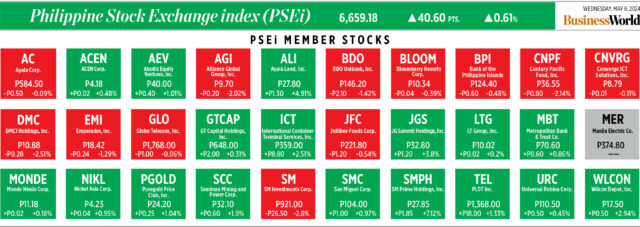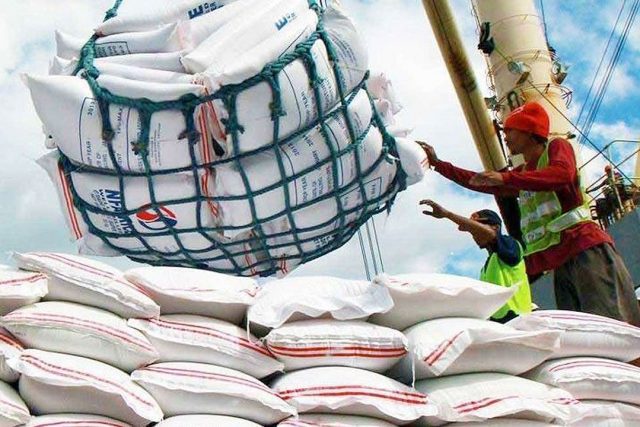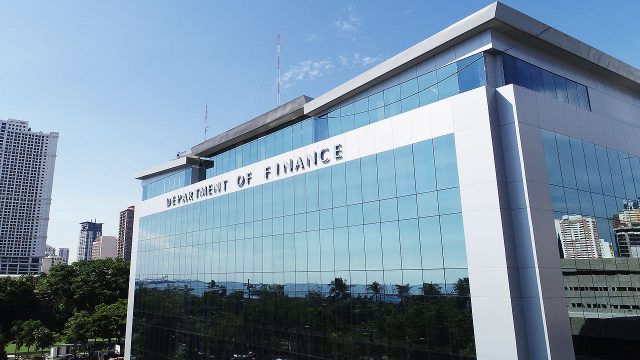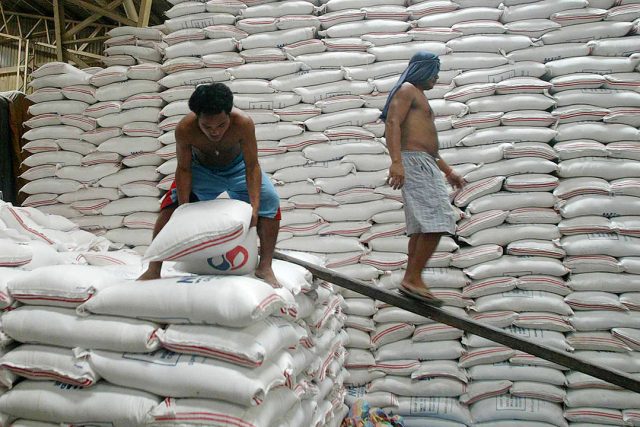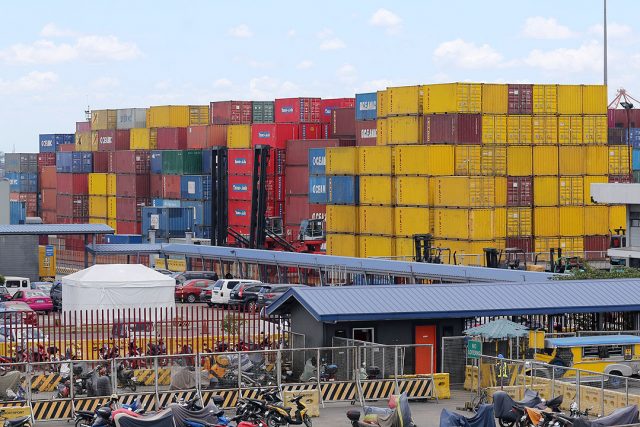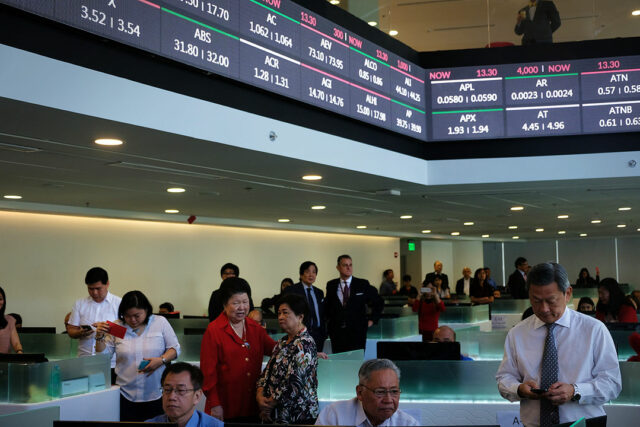House bill raising RCEF funding to P15B a year clears committee
THE House Appropriations Committee approved an unnumbered substitute bill on Wednesday amending the Rice Tariffication Law of 2019, including an expansion of funding for rice industry modernization to P15 billion a year from P10 billion.
The bill also extended the life of the Rice Competitiveness Enhancement Fund (RCEF) which is due to expire this year, for another six years. Under the law, RCEF receives its funding from tariffs generated from imports.
The original law liberalized private imports of rice, though it required importers to pay a 35% tariff on their shipments of Southeast Asian grain. The tariff has since been modified to apply to shipments from any country of origin as an inflation-control measure.
The amendment also seeks to reinstate the National Food Authority’s (NFA) power to regulate the rice market when needed to keep prices from rising unduly.
The amendments modify the way RCEF is allocated, proposing to grant 53.3% of its disbursements to farm mechanization, up from 50%. RCEF also funds seed development, farm credit, and extension services.
The new allocation for rice seed is 28%, and now allows the distribution of hybrid seed. The current version of the law only allows the distribution of inbred seeds.
“(The Rice Tariffication Law’s) focus really is to lower the cost of production, improving productivity, increasing yield, and increasing farmer income,” Nueva Ecija Rep. Mikaela Angela B. Suansing told BusinessWorld on the sidelines of the committee hearing.
The amendments are considered a means of easing the inflationary pressures blamed mainly on rice prices.
The average retail price of the grain currently ranges between P50 and P60, according to the Philippine Statistics Authority.
Speaker and Leyte Rep. Ferdinand Martin G. Romualdez said last week that the amendments have the potential to cut rice prices by at least P10 to P15 per kilo.
Allowing the NFA to regulate the market would allow the government to intervene during times of high retail prices, Quezon Rep. Wilfrido Mark M. Enverga told BusinessWorld.
“If this is enacted, it will be a big deal because (the government will regain) influence on the market through the NFA,” he said on the sidelines of the committee hearing.
Mr. Enverga, who also chairs the House Agriculture and Food Committee, said the NFA would make the rice prices more rational.
“We have to remember that it’s not only about the market interventions of the NFA… what we want to realize in the future… is that we fix our supply chain to lower the cost of rice production,” he said.
Commenting on the tweaks to the fund’s allocation, Ms. Suansing said: “The mechanization is still lacking… Even with the P30 billion allocated over the last 6 years, the mechanization coverage is only 14%… that’s why we increased it effectively.”
The new allocations also include 6% for credit assistance, 5% for extension services, 4% for soil health improvement, 2% for pest management, and 1.5% for the creation of a rice development office.
Mr. Enverga said he is hopeful that the amendment can go before plenary next week. — Kenneth Christiane L. Basilio
BoI seeking European funding for EV, RE dev’t
THE Department of Trade and Industry (DTI) said on Wednesday that the Board of Investments (BoI) will embark on an investment mission to Europe to solicit electric vehicle (EV), renewable energy (RE), upskilling, and agriculture investments.
In a statement, Trade Secretary and BoI Chairman Alfredo E. Pascual said that the investment promotion agency will be visiting Paris, London, and Berlin for roundtable and one-on-one meetings with industry representatives.
Mr. Pascual recently attended the European-Philippine Business Dialogue, presenting key industries welcoming European investment, including the industries that the BoI will deliver presentations on.
He said that the Philippines “is strategically positioned to become a leading player in Southeast Asia’s EV market,” which the DTI plans to achieve through the EV Incentives Scheme (EVIS).
“Through the EVIS, we target to produce four million locally manufactured EVs in the next 10 years,” he said.
“To achieve this, we aim to manufacture e-public utility vehicles (e-PUVs) and two-wheelers as our niche in Southeast Asia. We seek to be a competitive exporter of these products in our region,” he added.
He said European investors will have ready access to abundant green metals, a robust electronics industry, and a software development industry.
“These strengths complement the EU’s goal of eliminating greenhouse gas emissions by 2050 and support the transition from internal combustion engines to EVs,” he said.
“We are on track to build capacity for our flagship e-PUV model and develop light trucks and social-purpose vehicles to expand our domestic and export capabilities,” he added.
For renewable energy, he said that the Philippines has rich sources of renewable energy. He added that agriculture accounted for around 9% of Philippine gross domestic product and nearly 24.4% of the workforce last year.
“To seize these opportunities, the BoI is set to conduct a follow-through outbound mission to Europe for investment promotion with a focus on key markets in Paris, London, and Berlin,” Mr. Pascual said.
He said the Philippines produces around 900,000 graduates a year which will help support growth in the EV, renewable energy, and agriculture industries.
“The National Government calls for stronger collaboration with the EU on skills recognition, validation, and qualification alignment — all aimed at strengthening education and training systems to better serve the needs of European businesses operating in the country,” he added. — Justine Irish D. Tabile
PHL import dependence seen leading to market abuse, price shocks
THE Philippines’ dependence on imports to address food shortages leaves it exposed to price shocks and food market manipulation, the World Food Programme (WFP) said.
In a report, “Feeding Resilience: Unraveling the Asia-Pacific Food Crisis,” the WFP said the Philippines’ “unique contextual specificities of being a net food importer, particularly for staple commodities like rice, contribute to vulnerabilities in its food system.”
Heavy reliance on food imports, especially staples like rice, expose the country to price manipulation and artificial shortages, leading to economic impacts and corruption within government food procurement programs,” the WFP said.
“Opportunistic traders exploit market dynamics by hoarding essential supplies, exacerbating fluctuations in prices and availability,” it added.
Earlier, President Ferdinand R. Marcos, Jr. issued Executive Order (EO) No. 20 to ease the import process for agricultural products.
Farmers have opposed the EO, citing further exposure to smuggling and price manipulation.
Food inflation averaged 8% last year, a major factor being onion prices, which hit P600 to P700 a kilogram. A House of Representatives investigation pointed to an alleged onion cartel for the price surge.
Meat and egg production are also under strain from bird flu and African Swine Fever, it said.
It also noted the high costs of animal feed, which accounts for up to 70% of total production expenses in poultry, livestock, and aquaculture operations.
The WFP also cited a decline in the Philippines’ “resilience capacities” for food security, while its infrastructure and social capital have “better coped” with shocks.
“Unequal capacities among local government units (LGUs) in implementing government programs highlight the need for a more inclusive approach for urban and rural populations,” the WFP said.
LGUs should expand urban gardening, diversify staple food promotion, and strengthen local governance to ensure food security and nutrition, it said.
The Philippines was also noteworthy for its high consumption levels of food and beverages with poor nutritional value, such as fast food, processed food, and sugar-sweetened beverages.
“During the pandemic, the government’s distribution of food baskets aimed to assist the population in meeting its food needs, but unfortunately, many of these provisions failed to offer nutritious options,” according to the report.
“Despite the existence of a national policy on sugar sweetened beverages, with proceeds directed towards public health nutrition, the industry has seized the opportunity during this period to increase its sales.” — Beatriz Marie D. Cruz
PCCI warns of inflationary impact of plastics tax
THE government’s plan to collect an excise tax on single-use plastics could worsen inflation and present an undue burden to companies, a business chamber said.
The Philippine Chamber of Commerce and Industry (PCCI) said many businesses that use plastic for packaging will incur additional costs and pass them on to consumers.
“If it’s not cost-effective, they will pass on the cost, and it’s going to be costlier for the consumer,” PCCI Chairman George T. Barcelon said by phone.
Last week, the National Economic and Development Authority (NEDA) asked legislators to pass House Bill (HB) No. 4102 or the Excise Tax on Single-Use Plastic Bags.
The measure seeks to impose a P100 excise tax for every kilogram of single-use plastics removed from the place of production or released by the Bureau of Customs.
The bill remains in committee at the Senate. The House approved the bill on third and final reading in 2022.
The Philippines generates 2.7 million tons of plastic waste annually, according to the World Bank.
Mr. Barcelon said the plastic problem is a waste and land management issue, citing the costly logistics of recycling plastics.
“The local government should undertake a study with the private sector on which areas can be used to collect this waste and (process it),” he said.
A recent study by the United Nations Development Programme reported that only 26-58% of households practice waste management.
The government must strengthen its campaign to transition to reusable bags, the Philippine Retailers Association (PRA) said.
“We understand the proposed excise tax on the single-use plastics, but the PRA would like to propose parallel efforts to help reduce use of plastics,” PRA President Roberto S. Claudio said in a Viber message.
“Our biggest concerns are customers in wet markets who need to deal with perishable and wet products,” he said.
To discourage the use of plastics, the government could charge for the use of plastic bags in stores, the PRA said.
“We would like to see a concerted effort from the government and retail industry to promote the use of reusable bags.”
Meanwhile, NEDA also backed HB 26, seeking to ban the production, importation, sale, provision and use of single-use plastics.
Marian Frances T. Ledesma, zero waste campaigner at Greenpeace Southeast Asia-Philippines, said the bill would help cut greenhouse gas emissions, with extraction and production accounting for 90% of the plastic life cycle.
“Bans on single-use plastics can reduce health risks and toxic emissions from plastic production, prevent waste that exacerbates flooding and destroys ecosystems, and cut down on consumers’ exposure to harmful chemicals in plastics,” she said in an e-mail.
Eleanor L. Roque, tax principal at P&A Grant Thornton, expects minimal revenue to be generated from a single-use plastics excise tax.
“I don’t expect the additional tax collection from this to be significant. Major impact of this is really the effect on the environment,” she said in a Viber message.
A portion of funds generated from the tax should be allocated to assist micro-, small- and medium-sized enterprises in their transition to reusable bags, Ms. Ledesma said. — Beatriz Marie D. Cruz
Miners hope fiscal regime in place by middle of year
THE Chamber of Mines of the Philippines (CoMP) said it hopes the proposed fiscal regime for the mining industry is signed into law before the middle of the year.
“We’re hoping to get that bill passed into law before the first half is over, Para ma-report din ng Presidente as an accomplishment (So the President can report it as an accomplishment),” CoMP Executive Director Ronald S. Recidoro told reporters, apparently referring to the State of the Nation Address delivered to Congress in late July.
The proposed fiscal regime seeks to impose margin-based royalties and a windfall profit tax on mining companies.
The Department of Finance is proposing a margin-based royalty of 1.5-5%, with only four tiers, compared to the 10 tiers in House Bill (HB) No. 8937.
Large-scale metallic mining operations inside mineral reservations will still pay the government the equivalent of 5% of their gross output.
The House of Representatives approved HB 8937 on third and final reading in September.
“We came up with (five tiers) … A slight tweak to the DoF version,” he said.
“We think we can work with this fiscal regime. So we’re hopeful kasi maraming investors ’yan din lang ang binabantayan eh, na nakalutang ’yung tax regime (Many investors are waiting for a resolution on the tax regime),” he added.
Mr. Recidoro said that the new mining tax regime should be based on profits and not gross output.
“We are in agreement already on the principles of what a proper fiscal regime should look like. It should be based on profit rather than gross. Taxes are really heavy when based on gross,” he said.
He added that the mining industry is “somewhat in agreement” with the DoF that a fiscal regime should be based on profit margins.
“We think it’s equitable (and) competitive versus other countries,” he said.
Separately, CoMP Chairman Michael T. Toledo said the passage of a new mining tax regime will remove uncertainties currently deterring foreign investors.
“Because (this is) one of the reasons why foreign investors as well as domestic investors are also quite reluctant to invest,” Mr. Toledo added.
The government expects to generate P5.5 billion from royalties on miners operating within mineral reservations, P1.31 billion from royalties on miners operating outside reservations and P3.37 billion from windfall profit taxes.
Mining companies currently pay corporate income tax, excise tax, royalty, local business tax, real property tax, and fees to indigenous communities. — Adrian H. Halili
Bill proposes DoF take charge of processing VAT refund claims
A SENATE bill is proposing to transfer the responsibility of processing value-added tax (VAT) refund claims to the Department of Finance (DoF) from the Bureau of Internal Revenue (BIR).
Senator Sherwin T. Gatchalian, who heads the Senate Ways and Means Committee, said in Senate Bill No. 2654’s explanatory note: “Even after (claimants) submit the proper paperwork, the BIR continues to deny rebates by citing rules not clearly written in the tax laws or other laws and regulations.”
“Many companies are giving up on the VAT rebate due to the time, labor, and costs of dealing with the BIR.”
Under the measure, which Mr. Gatchalian filed on May 6, the DoF’s Revenue Operations Group will be tasked with processing VAT refund claims, instead of the BIR.
The Secretary of Finance will also be tasked with approving refund claims for creditable input taxes, taking the responsibility away from the internal revenue commissioner.
The American Chamber of Commerce of the Philippines, Inc. has said VAT refunds for jet fuel purchases take as long as five years to resolve.
The bill also seeks to impose a 2% tax on registered business enterprises (RBEs) operating in economic zones, based on their gross sales, while granting RBEs a 100% additional deduction on power expenses incurred in a taxable year, up from the 50% currently authorized by Tax Code, to address high power costs.
The bill also seeks to amend the applicability of an RBE’s net operating loss carryover to five years after the end of the income tax holiday period.
Registered export enterprises will also be given duty exemptions on imports of raw materials and spare parts for capital equipment.
Businesses will also be entitled to VAT zero-rating on local purchases, provided they operate at 70% capacity.
The CREATE MORE (CREATE to Maximize Opportunities for Reinvigorating the Economy) measure, which seeks to cut the corporate income tax to 20% from 25%, was passed by the House of Representatives on final reading in March, and has been transmitted to the Senate, Senate President Juan Miguel F. Zubiri said last month. — John Victor D. Ordoñez
Power crisis seen looming if China continues to block PHL exploration
THE Philippines’ inability to exploit oil and gas resources in the South China Sea because of interference from fellow territorial claimant China could result in a major power crisis, GlobalSource Partners said.
“If China sustains its bullying, the Reed Bank may never be exploited at all, and with Malampaya natural gas deposits nearly exhausted, the risk of power failures in the Philippines are a great probability,” GlobalSource Partners country analyst Diwa C. Guinigundo said in a brief.
“With power failures, and the probability of rising costs of energy, the gut issue of domestic inflation could resurge,” according to Mr. Guinigundo, a former central bank deputy governor.
The Philippines’ only indigenous source of natural gas, the Malampaya Gas Field off Palawan, is expected to be commercially depleted by 2027. The field’s output helps fuel about 40% of Luzon’s power needs.
The Reed Bank is thought to hold oil and natural gas deposits.
Exploration of the Reed Bank, also known as the Recto Bank, was deferred in 2012 following an order by the late President Benigno S.C. Aquino, III, amid tensions with China.
China claims more than 80% of the South China Sea, including areas identified as part of the Philippine exclusive economic zone (EEZ) by a United Nations-backed tribunal.
The Recto bank is 120 miles from Palawan, putting it within its 200-mile EEZ.
Former Energy Undersecretary Jose M. Layug, Jr. said natural gas in Recto Bank could exceed the 2.7 trillion cubic feet reserves estimated for Malampaya.
The Philippine Coast Guard recently accused its Chinese counterparts of firing water cannon at Philippine resupply vessels servicing the BRP Sierra Madre, a ship grounded on Ayungin shoal serving as a Philippine outpost.
China is also reportedly undertaking island-building activities near Thitu island, also known as Pag-asa, which is 300 miles from Palawan.
“While the Philippines could once again file for damages including the loss of livelihood of Filipino fishermen with the Arbitration Tribunal and win, the victory could be Pyrrhic unless the judgment is enforced,” he said, citing a suggestion by former Supreme Court senior associate justice Antonio T. Carpio to deduct any arbitral awards from loans extended by China.
The Philippines must bolster its own defense posture through higher budget allocations, Mr. Guinigundo said.
“With its sovereignty over its own territories ignored, it will require the Philippines to seriously consider strengthening its capacity for self-defense,” he said. — Beatriz Marie D. Cruz
Rice inventory drops 11% in early April as corn stocks rise
THE national rice inventory declined 10.9% year on year in early April, while corn stocks rose 21.2%, the Philippine Statistics Authority (PSA) said.
In a report, the PSA said the rice inventory was 1.64 million metric tons (MT), with a sharp fall noted in the quantity of rice held by the National Food Authority (NFA).
“Of this month’s total rice stocks, 57.1% were by households, 40.3% were from the commercial sector, and 2.5% were from the NFA depositories,” it said.
Rice held by the NFA fell 57.1% year on year to 641.56 thousand MT, while household rice stocks fell 7.6% to 938 thousand MT.
Commercial warehouses held 662 thousand MT for the period, dropping 9.1% from a year earlier.
Corn stocks in early April rose to 602.14 thousand MT from 496.74 thousand MT a year earlier.
It added that 84.8% of the total consisted of corn held by the commercial sector, while the remaining 15.2% were held by households. — Adrian H. Halili
March trade deficit narrows to $3.18 billion
THE March trade deficit was $3.18 billion, the smallest in nearly three years, as both exports and imports declined, according to preliminary data from the Philippine Statistics Authority.
The trade balance in March — or the difference between the value of exports and imports — was smaller than the $3.66 billion posted in February and the $5.02 billion from a year earlier.
The March reading was the smallest since the $3.18-billion deficit in May 2021.
The balance of trade has returned a deficit for nearly nine years, or since the $64.95-million surplus reported in May 2015.
Outbound goods shipments in March amounted to $6.13 billion, down by 7.3% from a year earlier.
This ended a two-month run of export growth and was the weakest performance since the 13% contraction in November.
Imports contracted by a fifth to $9.31 billion in March, the sharpest decline since the 20.8% drop posted in July 2020.
In the first quarter, the trade deficit narrowed 22.2% year on year to $11.24 billion.
During the period, exports rose 4.8% to $17.98 billion, while imports fell 7.6% to $29.22 billion.
The Development Budget Coordination Committee projects 3% and 4% growth in exports and imports, respectively, for this year.
Philippine Exporters Confederation, Inc. President Sergio R. Ortiz-Luis, Jr. said by phone that the narrower trade deficit reflected the flow of raw materials.
“Raw materials imports tapered towards the first quarter of the year compared to imports in the last quarter last year where they had to increase because of production targets,” Mr. Ortiz-Luis said.
Accounting for the bulk of exports were manufactured goods, which fell 4.6% to $4.97 billion in March.
Electronic products, which account for 58.6% of manufactured goods and more than half of total exports, rose 0.8% to $3.59 billion in March. Almost half of the total consisted of electronic products, where exports fell 0.2% to $2.80 billion.
Exports of mineral products, accounting for 9.3% of total exports, contracted 26.4% to $567.35 million in March.
Meanwhile, imports of raw materials and intermediate goods declined 25.2% to $3.18 billion. These accounted for a 34.2% share of the total.
Imports of capital goods declined 14.8% to $2.81 billion while imports of consumer goods fell $1.83 billion, 19.1% lower than last year.
Import of mineral fuels, lubricants, and related materials contracted by 18.1% to $1.46 billion in March.
Danilo C. Lachica, president of the Semiconductor and Electronics Industries in the Philippines Foundation, Inc., said in an e-mail that the contraction in imports and exports was mainly due to inventory correction and the impact of global geopolitics.
He expects growth in electronics exports to be flat in 2024 with “exports higher than imports (in the coming months).”
The US was the top destination of Philippine goods for March, accounting for 15.7% or $961.94 million. It was followed by Hong Kong, which took 14.4% or $880.88 million, and Japan with 12.9% or $790.02 million.
Meanwhile, China was the main source of imported products, accounting for 24.4% or $2.27 billion of the total import bill.
Despite the contraction in imports and exports for March, Mr. Ortiz-Luis expects the Philippines to hit its trade targets for the year.
“The trade balance will improve, or it will more or less be the same unless there are surprises from the outside,” Mr. Ortiz-Luis said. — Andrea C. Abestano
Request for reinvestigation revisited
Taxation is one of the government’s great powers. Collecting taxes is essential for government to perform its functions and should not be hindered unnecessarily. To balance this power, the taxpayer is accorded the right to due process of the law, or the right to be heard.
For tax investigations in the Philippines, the taxpayer is accorded due process at every stage of a Bureau of Internal Revenue (BIR) audit. Beginning from the issuance of the Notice of Discrepancy all the way through to the issuance of the Preliminary Assessment Notice and Final Assessment Notice/Formal Letter of Demand (FAN/FLD), a taxpayer is granted an opportunity to explain its position and refute the findings presented. In case the taxpayer has exhausted all administrative remedies available and no agreement has been reached with the BIR, the taxpayer can still resort to judicial remedies.
But like any right, the right to due process must be exercised in accordance with the law, implementing rules and regulations, and jurisprudence.
On Jan. 29, the Court of Tax Appeals (CTA) promulgated its decision in CTA Case 10039, in which it declared as valid the BIR’s denial of a taxpayer’s request for reinvestigation. In the case in question, the BIR issued a FAN/FLD to the taxpayer, which the latter protested with a request for reinvestigation within the prescribed period. However, the BIR denied the request, contending that the taxpayer did not file a valid protest, among others. The taxpayer argued that the denial was premature and a violation of due process. Thus, a petition for review was filed with the court to appeal the denial. The CTA ruled that the taxpayer’s request for reinvestigation did not meet the requisites of a valid protest letter. Moreover, the denial of the request for reinvestigation could not be considered the BIR’s final decision on the disputed assessment, which would put it under the jurisdiction of the CTA.
Citing the Supreme Court, the CTA ruled that if a taxpayer’s response to the FAN/FLD does not meet all the requirements of a valid protest, then there is no administrative protest to speak of.
The CTA reiterated that the protest letter filed must be in such form and manner as prescribed by the implementing rules and regulations. Specifically, a valid protest letter must state all of the following elements: (a) the nature of the protest; i.e., reconsideration or, reinvestigation specifying the newly discovered or any additional evidence which the taxpayer intends to present; (b) the date of the assessment notice; and (c) the applicable laws, rules and regulations, or jurisprudence on which the taxpayer’s protest is based. Lacking any of these would result in a protest which is void and without force and effect.
In the case at hand, the court held that the taxpayer’s protest letter was void as it only stated the nature of the protest (i.e., request for reinvestigation) and nothing more.
The tax court likewise held that since the taxpayer’s response was void, the BIR’s denial of its request for reinvestigation cannot be considered the BIR’s final decision on a disputed assessment. As there is no decision on disputed assessment to assail, the CTA cannot acquire jurisdiction over the case. Thus, the petition was considered to be prematurely filed and dismissed.
Under the implementing rules and regulations, if the taxpayer’s request for reinvestigation cannot be considered a valid protest, this can be equated to a failure to file a valid protest against the FAN/FLD. Thus, the assessment becomes final, executory and demandable. That said, without a valid protest, the administrative and judicial appeals with the Commissioner and CTA, respectively, are not available to the taxpayer.
The pronouncements of the CTA in this case emphasize the significance of a valid protest. It is worth noting that rights accorded to taxpayers must be exercised with due consideration of the laws which form the boundaries for such use. Otherwise, it cannot be given the expected weight it normally carries to balance the scales against the state’s power to tax. Such as in this case, without a valid protest, it cannot be said that the taxpayer’s right was violated which entitles him to seek remedy with the CTA. More critically, without a valid protest, the BIR’s assessment would become final and executory under our tax law.
As we expect the State to impose its power to collect taxes with due regard to the taxpayer’s right, the taxpayer is likewise expected to not sleep on his right. Such a right must be exercised exhaustively or else it will be lost. The taxpayer cannot later turn to the courts for remedy on a right which he has failed to avail of.
The views or opinions expressed in this article are solely those of the author and do not necessarily represent those of Isla Lipana & Co. The content is for general information purposes only, and should not be used as a substitute for specific advice.
Elizabeth K. Adaoag-Belarmino is a manager at the Tax Services department of Isla Lipana & Co., the Philippine member firm of the PricewaterhouseCoopers global network.
Shares climb on bargain hunting, economic data
PHILIPPINE STOCKS ended in positive territory on Wednesday as investors hunted for bargains amid higher unemployment figures in March.
The bellwether Philippine Stock Exchange index (PSEi) rose by 0.61% or 40.60 points to end at 6,659.18 on Wednesday, while the broader all shares index gained by 0.3% or 10.82 points to close at 3,516.57.
“The local bourse rebounded by 40.60 points (0.61%) to 6,659.18 driven by bargain hunting,” Philstocks Financial, Inc. Research Analyst Claire T. Alviar said in a Viber message.
“Moreover, positive employment figures bolstered sentiment. The unemployment rate increased to 3.9% in March compared to February’s 3.5%; nonetheless, this figure was still considered tight and lower than the previous year’s 4.7%,” she added.
The Philippine Statistics Authority (PSA) on Wednesday reported that the number of unemployed Filipinos in March dropped to two million in March from 2.42 million in the same period last year.
Shares rose as investors welcomed data showing the country posted a narrower trade deficit in March, Regina Capital Development Corp. Head of Sales Luis A. Limlingan said in a Viber message.
The balance of trade in goods reached $3.18 billion in March, down by 36.6% from the $5.02 billion deficit in the same month a year ago, separate PSA data released on Wednesday showed.
“Gold prices climbed as traders anticipated a potential Fed rate cut this year. However, oil prices remained flat amid uncertainty over the ceasefire in Gaza, with the Brent contract narrowing by 0.2% to $83.16 per barrel and West Texas Intermediate retreating by 0.13% to $78.38 per barrel,” Mr. Limlingan added.
Back home, sectoral indices were mixed on Wednesday. Property climbed by 4.71% or 111.34 points to 2,474.44; services went up by 1.61% or 31.08 points to 1,959.96; and mining and oil rose by 0.04% or 3.97 points to 9,104.88.
Meanwhile, holding firms dropped by 1.02% or 62.18 points to 5,998.41; financials retreated by 0.5% or 10.51 points to 2,066.92; and industrials declined by 0.02% or 2.02 points to 9,055.02.
“The property sector jumped the most. This surge was led by SM Prime Holdings, Inc., which increased by 7.12%, and Ayala Land, Inc., which rose by 4.91%, leading the gainers among the PSEi,” Ms. Alviar said.
“On the other hand, SM Investments Corp. was at the bottom, losing 2.8%,” she added.
Value turnover went down to P5.98 billion on Wednesday with 434.16 million shares changing hands from the P11.52 billion with 7.9 billion issues traded on Tuesday.
Advancers outnumbered decliners, 99 versus 91, while 40 names were unchanged.
Net foreign selling went down to P9.45 million on Wednesday from P890.07 million on Tuesday. — Revin Mikhael D. Ochave

